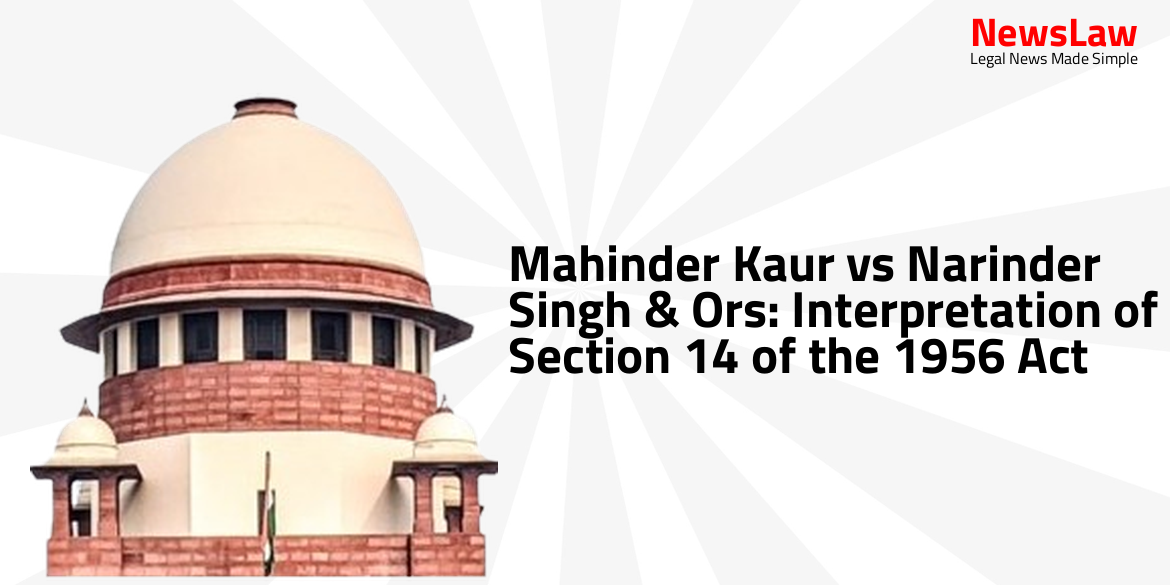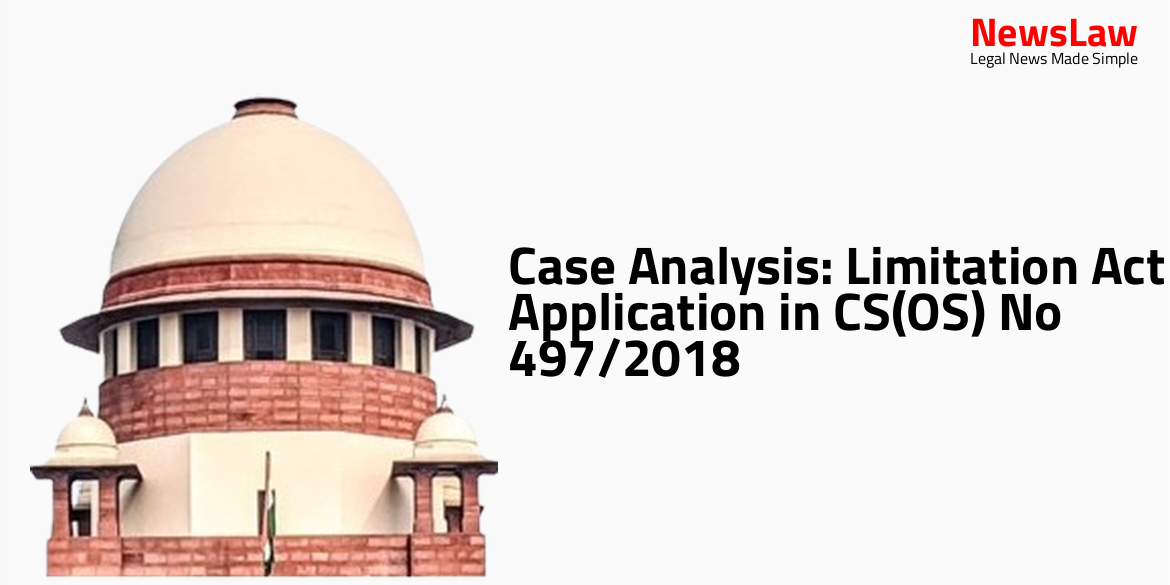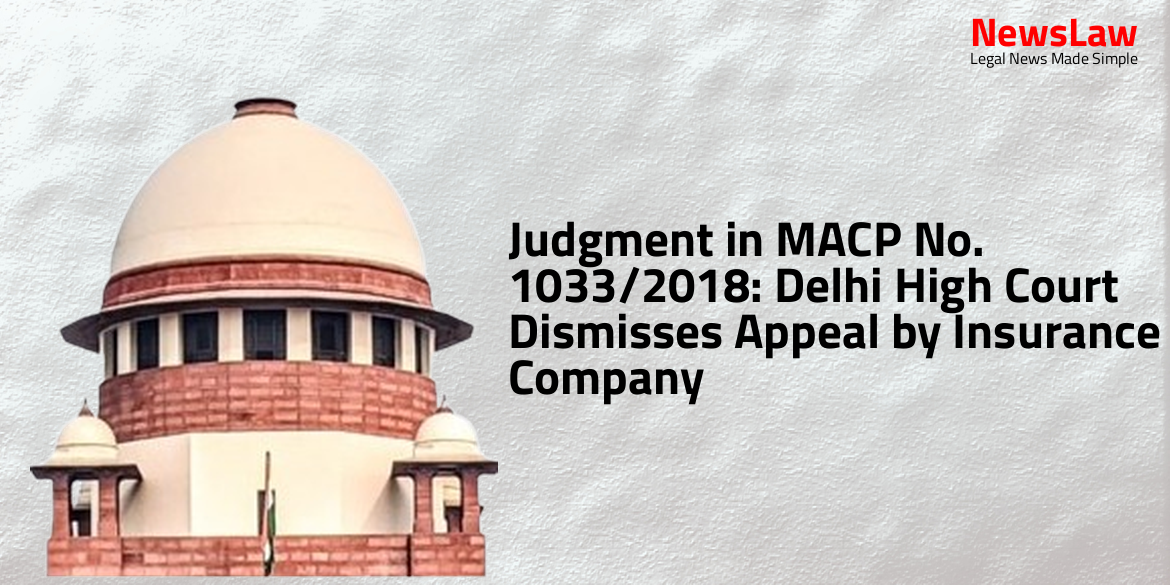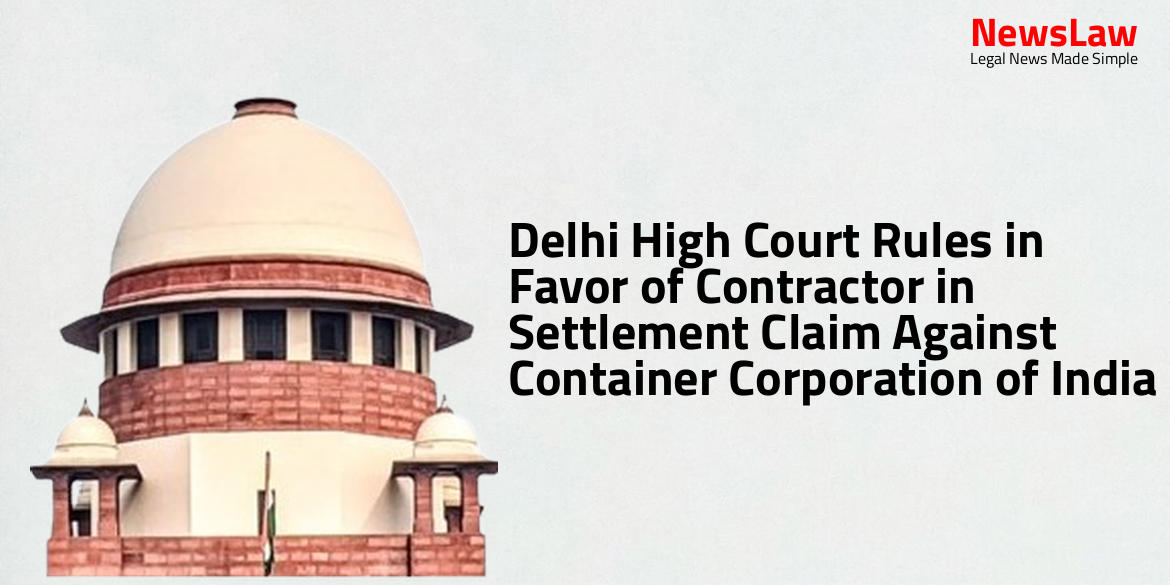In a landmark case involving Mahinder Kaur and Narinder Singh & Ors, the Supreme Court of India deliberated on the interpretation of Section 14 of the 1956 Hindu Succession Act. The case revolves around the rights to property and maintenance as specified in a Will dated 13 January 1989. The judgment is crucial in defining the extent of ownership under the Act and the implications of granting a life estate. Let’s dive into the details of this significant legal ruling.
Facts
- Mahinder Kaur lived in the subject property for 23 years, relying on the rent for maintenance.
- The property transformed ownership after her husband’s death under Section 14(1) of the 1956 Act.
- Legal heirs entitled to inherit the property equally as Class-1 heirs under the 1956 Act.
- Subject property expanded to the second floor from the first floor at the time of Mahinder Kaur’s death.
- A Will was executed in January 1989 granting Mahinder Kaur a lifetime estate in the property.
- General Power of Attorney issued to Respondent No 1 for managing the property and overseeing construction.
- The Will excluded certain sons from inheriting properties, specifying distribution among others.
- Mahinder Kaur granted a life or restricted estate in the property.
- Issue arose regarding the interpretation of Section 14(2) of the 1956 Act in the present petition.
- Trial Court held that the Will specified a life estate but under Section 14(1) of the 1956 Act, it was converted into absolute ownership.
- The property should devolve according to intestate succession upon her death.
- The Court ruled in favor of the Respondents, dismissing claims to dismiss the suit based on the terms of the Will dated 13 January, 1989.
Issue
- The key issue in the case is whether the Will of Late Shri Gurcharan Singh dated 13 January, 1989, granting a life estate in the suit property to his wife Smt. Mahinder Kaur should be interpreted as creating an absolute right for his wife or as a form of maintenance.
- The trial court framed several issues, including the validity of the Will, the entitlement of the plaintiff to a partition decree, and the grant of permanent injunction.
- On 15 November, 2019, the court narrowed down the issue to determining the nature of the right granted to Smt. Mahinder Kaur in the Will.
- On 21 April, 2022, the Supreme Court’s judgment in Jogi Ram v. Suresh Kumar & Ors [2022 INSC 131] was brought to the attention of the court.
- The ultimate decision will revolve around whether the Will provided Smt. Mahinder Kaur with an absolute ownership right or if it was intended as a provision for her maintenance.
Arguments
- The petitioner argues that the interpretation of Section 14 of the 1956 Act by the trial court was erroneous.
- The petitioner’s counsel states that the judgment in Jupudy Pardha (supra) is not applicable to the case at hand as it dealt with a Will prior to the enactment of the 1956 Act.
- The petitioner emphasizes that the Will in question is dated 13 January 1989, falling under the purview of the 1956 Act.
- The petitioner contends that the trial court misapplied Section 14(1) of the 1956 Act.
- It is argued that any interpretation rendering Section 14(2) redundant cannot be accepted based on the judgment in Sadhu Singh v. Gurudwara Sahib Narike (2006 INSC 586).
- The petitioner asserts that the trial court’s decision is unsustainable given the misinterpretation of the relevant law.
- The petitioner further distinguishes the case from Jogi Ram (supra) by highlighting the specific provisions of Section 14(2) of the 1956 Act.
- The petitioner raises concerns regarding how the trial court relied on Jupudy Pardha (supra) without proper legal justification.
- Respondent No.5 is in partial possession and co-owns the property specified in the Will executed by late Gurcharan Singh.
- The Will stipulated that Mahinder Kaur could only recover rent and lease the subject property, interpreted by the Trial Court as conferring maintenance rights.
- The 10 shops in the subject property generate rental income that is treated as maintenance and not the property of the mother.
- The life estate given to the mother should not automatically imply absolute ownership, as per the arguments.
- The Will granted Mahinder Kaur a life estate with specific rights for maintenance purposes.
- The subject property was self-acquired by Gurcharan Singh, who left a life estate to his wife via a registered Will in January 1989.
Analysis
- Section 14(1) of the Hindu Succession Act, 1956 specifies that any property possessed by a female Hindu is to be held by her as a full owner and not as a limited owner. This includes both movable and immovable property acquired through various means.
- The creation of a limited interest in favor of the wife, who had a pre-existing right of maintenance, transforms into an absolute right by the operation of Section 14(1) of the Act.
- Any charge created for the maintenance of a female is legally enforceable, ensuring her right to maintenance against the property.
- The Supreme Court’s decisions differentiate between Section 14(1) and Section 14(2) of the 1956 Act, emphasizing the need to protect women’s interests in property bequeathals.
- The judgments in Jogi Ram and Munni Devi cases reiterate the tangible right of Hindu women to maintenance, emphasizing the liberal interpretation of Section 14 to advance the socio-economic objectives of the Act.
- The rights of a Hindu woman to enjoy property during her lifetime, as seen in various cases, strengthen the argument for a broader interpretation of Section 14(1) over Section 14(2) of the Act.
- The intent of Section 14 is to convert limited ownership into full ownership for Hindu women, ensuring complete disposition powers and inheritance by their heirs.
- The case law highlights the significance of providing Hindu women with life interests in properties to secure their financial stability, particularly if they lack independent income sources.
- The judgment analyzed the provisions of Section 14(1) and Section 14(2) of the 1956 Act in detail.
- The testator’s intention in the Will regarding the limited estate granted to his wife was a key aspect considered by the Court.
- The Court discussed the distinction between a ‘life interest’ as maintenance and absolute property rights.
- The judgment emphasized that the limited estate granted to the wife did not automatically convert into absolute ownership as it was specified in the Will.
- The Court referenced previous cases such as Sadhu Singh in determining the application of Section 14(1) and Section 14(2) of the Act.
- It was highlighted that the wife did not possess any rights in the property before the Will and hence received a limited estate as per the Will.
- The Court considered the implications of the provisions of Section 14(1) and Section 14(2) on the nature of the estate held by the testator and the rights granted to the wife.
- The intention of the testator and the specific conditions outlined in the Will were crucial factors in determining the extent of the wife’s rights to the property.
- The judgment emphasized that a restricted estate given for maintenance does not automatically convert into absolute ownership unless specified in the Will.
- The Court highlighted that Section 14(1) and Section 14(2) had to be construed in a manner that respected the testator’s intentions and the specific bequests made in the Will.
- The property in question was part of the HUF, not self-acquired property.
- The decision being referred to is clearly distinguishable on facts and not applicable.
Decision
- The trial in the suit is concluded, and final arguments are fixed before the ld. Trial Court.
- The ld. Trial Court has stated that the suit property shall devolve as per successorship and not as per the Will dated 13.01.1989.
- The present suit is decided in favor of the plaintiff and against the defendants.
- The order of the Trial Court has been challenged by two of the defendants, including Narinder Singh.
- Notice was issued in the present petition and replies were filed by Respondent Nos. 1 to 4 and 6.
- The impugned order of the Trial Court dated 26 September 2017 is set aside.
- The preliminary issue on whether the suit should be dismissed due to the existence of the Will dated 13.01.1989 is decided in favor of the Petitioners and Narinder Singh.
Case Title: MANMOHAN SINGH & ANR Vs. SHITAL SINGH & ORS (2024:DHC:3185)
Case Number: CM(M)-1333/2017



